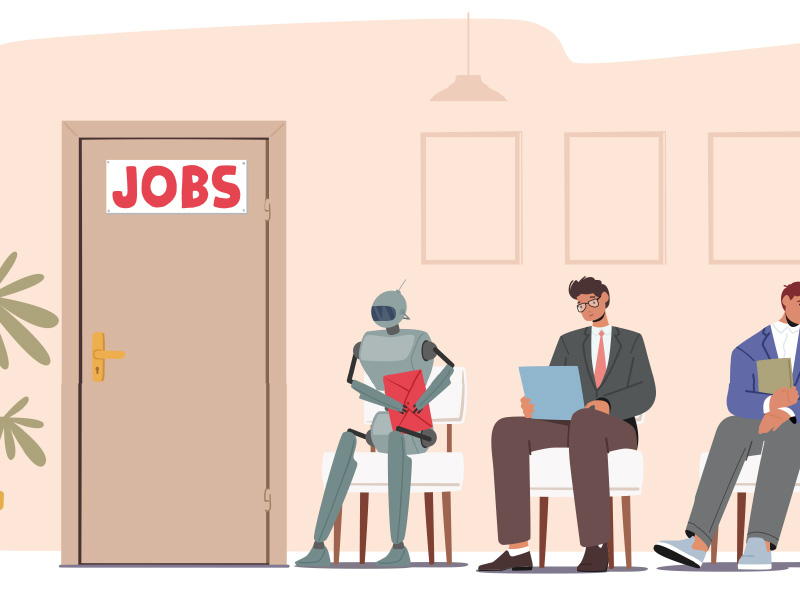Celeb Shot
Why Some People Shouldn’t Worry About AI Replacing Them
Veteran Fortune Journalist, Geoff Colvin, dives into the pressing question, “Will artificial intelligence take your job?” shedding light on the unique human abilities that remain irreplaceable, even in an age of advanced AI.

Will artificial intelligence take your job?
A popular response is, “You probably won’t lose your job to AI, but you might lose it to someone who knows how to use AI.” That’s a realistic answer right now, though some workers may be threatened by AI a few years from now. Nonetheless, after years of studying technology and work, I’m confident the future is bright for at least some workers and maybe for the vast majority. Here’s why.
When I wrote Humans Are Underrated: What High Achievers Know that Brilliant Machines Never Will eight years ago, I explicitly made two assumptions: that indistinguishable humanoid robots will not exist in our lifetimes, and that humans will remain in charge of the world. Those are still the crucial assumptions. Examining them shows us much about the future of human workers in the era of advanced AI.
Indistinguishable humanoid robots – machines like “synths” in the Humans TV series or “replicants” in the movie Blade Runner – still seem far in the future. But indistinguishable humanoid video robots seem right around the corner. These creations will exist only on screens. They will look and sound just as real as any actual human on a screen, and they will behave and interact with us in real time. Eventually, maybe soon, they will be smarter than any of us.
In competition with those creations, we humans look like losers. Actual people have inconvenient personal lives. They must eat and sleep. By contrast, the video human can participate in meetings 24 hours a day, doesn’t need health insurance, is never hungover, and can be configured to your specifications. Why on earth would any company hire a physical human as a manager or CFO?
The answer hinges on the second assumption, that the world continues to be run by and for humans. So long as people are at the top of the organization chart – which will likely be an extremely long time – they will insist on working with real, in-person, physical humans, and for a very good reason: We are hard-wired to work better that way.
Consider something as simple and brief as shaking hands. In experiments on negotiation conducted by Harvard’s Francesca Gino and colleagues, negotiators who shook hands first were more open and honest than those who didn’t, and reached better outcomes, even with all else held constant. Shaking hands affects us deeply. It is literally an electric experience: brain imaging shows that we energize the region associated with reward sensitivity – that is, we feel rewarded – not only by shaking hands, but simply by seeing other people shake hands.
Interacting with a genuine human in person builds trust – an increasingly valuable currency today – in ways that nothing else can. Conversing face-to-face, in person, the pupils of our eyes contract and dilate in response to one another, though we’re not aware of it; our brains literally synchronize, with the same regions of both persons’ brains lighting up at the same time; we unconsciously mimic one another’s posture, tone of voice, and even accent. It all builds trust, and it happens only in person.
Steve Jobs, who spent much of his life connecting us digitally, believed fervently that innovation happens only in person. “Creativity comes from spontaneous meetings, from random discussions,” he told his biographer, Walter Isaacson. “You run into someone, you ask what they’re doing, you say ‘Wow,’ and soon you’re cooking up all sorts of ideas.” We shouldn’t be surprised that, after a brief post-pandemic burst of enthusiasm for remote work, CEOs are slowly, steadily insisting that employees return to the office at least part-time.
But won’t we be able to do all these in-person activities just as well online, in the metaverse? That day may come, but it won’t be anytime soon. Eye-to-eye contact, mimicking of voice and posture – our avatars may do those things as metaverse technology advances far beyond its current state. But even then, the powerful element of physical touch – not just handshaking, but also hugs, slaps on the back, accidental bumps in the cafeteria – will be absent. To experience touch remotely will probably require brain-computer interfaces, somewhat spooky devices that are being developed now for medical purposes. Other uses seem very distant.
When we step back and look into the era of advanced AI, it’s clear who the winners will be. They will be people whose positions require them to work with other people and who possess the deep skills of human interaction that make them great at doing so.
Technology is taking over more of our work, as it has always done; over time we have responded to the challenge by learning new skills, a cycle that has improved living standards enormously. Now, as AI takes over more of our work, we are called upon to master not new skills, but old ones. As that trend advances, the people who master the deeply human abilities that are fading all around us will be the most valuable people in our world.
Events aren’t easy, but working with WSB is. WSB works with thousands of respected influencers, thought leaders, and speakers each year and our experienced sales team is committed to the success of your event. For more AI speaker ideas, please contact us.
